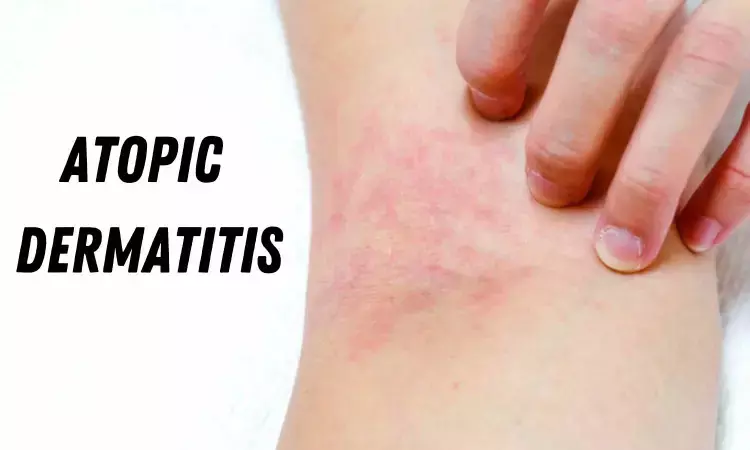- Home
- Medical news & Guidelines
- Anesthesiology
- Cardiology and CTVS
- Critical Care
- Dentistry
- Dermatology
- Diabetes and Endocrinology
- ENT
- Gastroenterology
- Medicine
- Nephrology
- Neurology
- Obstretics-Gynaecology
- Oncology
- Ophthalmology
- Orthopaedics
- Pediatrics-Neonatology
- Psychiatry
- Pulmonology
- Radiology
- Surgery
- Urology
- Laboratory Medicine
- Diet
- Nursing
- Paramedical
- Physiotherapy
- Health news
- Fact Check
- Bone Health Fact Check
- Brain Health Fact Check
- Cancer Related Fact Check
- Child Care Fact Check
- Dental and oral health fact check
- Diabetes and metabolic health fact check
- Diet and Nutrition Fact Check
- Eye and ENT Care Fact Check
- Fitness fact check
- Gut health fact check
- Heart health fact check
- Kidney health fact check
- Medical education fact check
- Men's health fact check
- Respiratory fact check
- Skin and hair care fact check
- Vaccine and Immunization fact check
- Women's health fact check
- AYUSH
- State News
- Andaman and Nicobar Islands
- Andhra Pradesh
- Arunachal Pradesh
- Assam
- Bihar
- Chandigarh
- Chattisgarh
- Dadra and Nagar Haveli
- Daman and Diu
- Delhi
- Goa
- Gujarat
- Haryana
- Himachal Pradesh
- Jammu & Kashmir
- Jharkhand
- Karnataka
- Kerala
- Ladakh
- Lakshadweep
- Madhya Pradesh
- Maharashtra
- Manipur
- Meghalaya
- Mizoram
- Nagaland
- Odisha
- Puducherry
- Punjab
- Rajasthan
- Sikkim
- Tamil Nadu
- Telangana
- Tripura
- Uttar Pradesh
- Uttrakhand
- West Bengal
- Medical Education
- Industry
New Study Links High Systemic Immune-Inflammation Index to Atopic Dermatitis Risk in Adults with BMI Less Than 30

USA: A recent cross-sectional study using data from the National Health and Nutrition Examination Survey (NHANES) from 2001 to 2006 reveals a significant association between systemic immune-inflammation index (SII) levels and the risk of atopic dermatitis in US adults.
This study, published in Frontiers in Medicine, highlights that an SII higher than 330 × 10^9/L correlates with an increased risk of atopic dermatitis, particularly among individuals with a body mass index (BMI) less than 30.
"In adults with a BMI under 30, a Systemic Immune-Inflammation Index exceeding 330 × 10^9/L is linked to a 44% increased risk of developing atopic dermatitis (OR, 1.44). This finding points to SII as a potential new risk factor for atopic dermatitis. Incorporating SII into diagnostic criteria could lead to earlier detection and more effective preventive management of the condition," the researchers reported.
The systemic immune-inflammation index, a marker that combines platelet, neutrophil, and lymphocyte counts to gauge systemic inflammation, has been studied in various contexts. Although numerous studies have observed a correlation between elevated SII and various diseases, research specifically exploring the relationship between SII and atopic dermatitis is still limited. To fill this knowledge gap, Qike Ding, Department of Dermatology, The First Affiliated Hospital of Shantou University Medical College, Shantou, Guangdong, China, and colleagues seek to examine the association between SII and atopic dermatitis among outpatient US adults.
For this purpose, the researchers conducted a compensatory cross-sectional study using NHANES data from the 2001–2006 cycles. They employed sample-weighted multivariate logistic regression and performed stratified analyses of sub-groups to investigate the associations.
The study analyzed data from 31,509 NHANES participants between 2001 and 2006. After excluding those under 20, over 59, or missing SII data, and removing 10 with missing atopic dermatitis data, 9,097 participants were included.
The study led to the following findings:
- Logistic regression analysis did not show a significant overall association between SII and atopic dermatitis after adjusting for covariates.
- In the subgroup with a BMI under 30, both univariate and multivariate analyses revealed that an SII higher than 330 × 10^9/L was linked to an increased risk of atopic dermatitis.
- In the crude model, the odds ratio was 1.53, and in the adjusted model, it was 1.47.
- After controlling for all confounding factors, the association remained significant, with an odds ratio of 1.44.
- There were no similar associations in participants with a BMI of 30 or higher.
- Stratified analyses indicated no modifiers in the relationship between SII and atopic dermatitis for those with a BMI under 30.
- Missing data rates were low (0 to 4.8%), so no imputation methods were applied.
"To our knowledge, this is the first study examining the impact of elevated SII levels on the risk of atopic dermatitis in the outpatient US population. Given the varying diagnostic standards for atopic dermatitis across different countries, our findings could have significant implications for understanding and managing the condition globally," the researchers concluded.
Reference:
Ding, Q., Lin, L., Li, X., Xie, X., & Lu, T. (2024). Association between systemic immune-inflammation index and atopic dermatitis: A cross-sectional study of NHANES 2001–2006. Frontiers in Medicine, 11, 1461596. https://doi.org/10.3389/fmed.2024.1461596
Dr Kamal Kant Kohli-MBBS, DTCD- a chest specialist with more than 30 years of practice and a flair for writing clinical articles, Dr Kamal Kant Kohli joined Medical Dialogues as a Chief Editor of Medical News. Besides writing articles, as an editor, he proofreads and verifies all the medical content published on Medical Dialogues including those coming from journals, studies,medical conferences,guidelines etc. Email: drkohli@medicaldialogues.in. Contact no. 011-43720751


